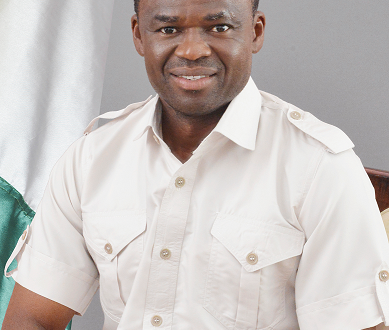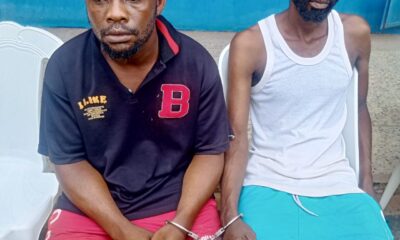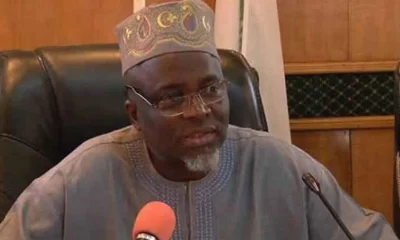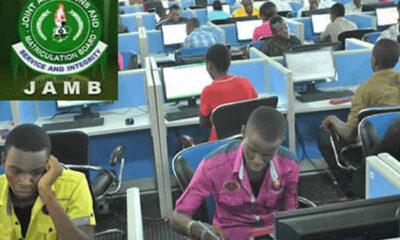Headline
Hundreds Go Missing In Burkina Faso Amid Extremist Violence
Published
2 years agoon
By
Editor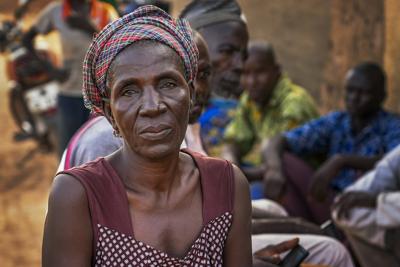
The last time Polenli Combary spoke to her son on the phone she prayed for God to bless him. Shortly after, she called back but the line was dead.
Her 34-year-old son was returning a truck used to move the family’s belongings from their village in eastern Burkina Faso after jihadis forced everyone to leave. He disappeared in March.
“We will keep searching … I’m just praying to God to have him back,” said Combary, 53, sitting despondently in the eastern city of Fada N’Gourma where she now lives.
Islamic extremist violence is ravaging Burkina Faso, killing thousands and displacing more than 1 million people.
And people are going missing. Reports of missing relatives quadrupled from 104 to 407 between 2019 and 2020, according to the International Committee of the Red Cross, which defines a missing person as someone whose whereabouts cannot be accounted for and requires state intervention.
“With the conflict, you have more sudden movements of people, you have more incidents which can lead to separation and disappearance,” said Marina Fakhouri, head of protection with the ICRC in Burkina Faso. “Certainly we are concerned also by the number of families who are coming to us directly to signal that they have a missing relative and need support.”
READ ALSO: China, US To Ease Restrictions On Each Other’s Journalists
People have previously gone missing in the West African nation due to migration, floods or shocks from climate change, but the magnitude has increased because of the violence, she said.
Tracing people during a conflict and in a context of mass displacement is challenging, can cause tensions within families and communities and psychological and physical distress. One month after her son disappeared, Combary’s husband died of a heart attack due to the shock, she said.
While some families blame the jihadis for the disappearances of their loved ones, many others point to the security forces as the main perpetrators. During a trip to Fada N’Gourma in October and speaking to people in the Sahel province by phone, three families, including Combary’s, told The Associated Press they suspect the army is responsible for their missing relatives.
The military has been accused by rights groups of extrajudicial killings and targeting people deemed to be associated with the jihadis. About 70% of families reporting people missing allege it is linked to the security forces, said Daouda Diallo, executive secretary for the Collective Against Impunity and Stigmatization of Communities, a civil society group.
There’s been a reduction of reported cases affiliated with the military since the end of last year, which Diallo attributes to a report by Human Rights Watch that accused the army of being involved in mass killings, said Diallo. But now the abuses are being committed by volunteer fighters, civilians armed by the state, he said.
“It is sad to see that the violence has been subcontracted to armed civilians or militia in the field,” Diallo said.
The ministry of defense did not respond to requests for comment.
Burkina Faso’s increasing violence fuels impunity among the security forces and the abductions and killings highlight the absence of the rule of law, conflict analysts say.
“A significant proportion of the violence is attributed either to jihadist groups or ‘unidentified armed men’ making it easy to absolve certain parties of responsibility. It’s easy to kill people or make them disappear, but much more difficult to protect them,” said Heni Nsaibia, senior researcher at the Armed Conflict Location and Event Data Project.
Families searching for relatives they believe were taken by state agents say they don’t know where to turn. Hamadou Diallo’s nephew was allegedly arrested by the army outside Dori town in the Sahel province in 2019, he said. Unaware of any organization that could help other than the military, Diallo stopped searching.
“Nobody had the courage to approach (the army),” he said. “After one or two weeks, if you don’t see a family member, that means (they’re dead).”
Rights groups say the government is obligated to investigate all cases of disappearance, hold people responsible and use the judiciary and the national human rights commission, said Corinne Dufka, West Africa director for Human Rights Watch.
“Both institutions need to redouble their efforts on behalf of families whose loved ones went missing at the hands of state security forces or armed Islamists. They have a right to the truth and to justice,” she said.
But while families with missing relatives search for answers, they live in limbo.
READ ALSO: Sudanese Migrants In Israel Fear Deportation After Coup
Fidele Ouali hasn’t seen his 33-year-old brother since he disappeared a year and a half ago, he said. A farmer and father of five, Ouali said he was close to his brother, but as time passes, he’s finding it harder to remember him.
“All my memories are wiped out,” said Ouali. Clutching his brother’s birth certificate which he carries everywhere, Ouali said he is torn between giving up completely and hanging onto the hope that one day he might see his brother again.
(AP)
You may like
Headline
PICTORIAL: C&S Church Ayo Ni O Installs New Leader
Published
6 hours agoon
May 2, 2024By
Editor
The Cherubim and Seraphim (S&S) Movement Church Worldwide, on Wednesday, formally installed Prophet Emmanuel Alogbo as the 6th Baba Aladura and spiritual head of the church.
Alogbo was appointed the acting spiritual head in November 2023 following the death of his predecessor, Samuel Abidoye, who died on November 12, at the age of 103.
A statement published on the official website of the church reads, “The ascension of Most Senior Special Prophet Dr. Emmanuel Abiodun Alogbo to the revered position of Spiritual Father and Chairman of the Cherubim and Seraphim Movement Church signifies a pivotal moment in the history of the church, ushering in a new era of leadership and guidance for its global congregation.”
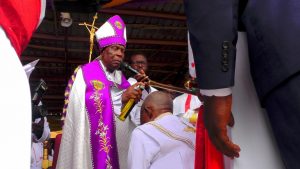
READ ALSO: Officer Who Shot Man Dead During Fuel Queue Tumult Identified — Lagos Police
Alogbo’s installation was reported to have been attended by important figures in the church, “including the Olori of Cherubim and Seraphim Unification, His Most Eminence Pro. Dr. S. A. Alao J.Pil., who performed the anointment, which added to the solemnity and grandeur of the occasion.”
Alao was said to have charged the new Baba Aladura to embrace his role with strength and courage.

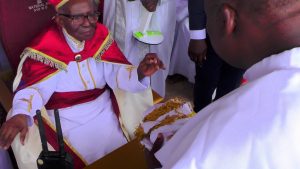
Congregants were also said to have recognised Alogbo as an embodiment of divine wisdom, compassion, and spiritual insight.
In his pledge to the CSMC Worldwide, the new Baba Adura was quoted assaying, “I solemnly pledge to continue the good work of moving our beloved church forward, which the late Baba Aladura Prophet Samuel Adefila Abidoye started.
“It is my firm commitment to ensure that the C&S Movement Church continues to march on, spreading its message of faith and love to all corners of the globe.”
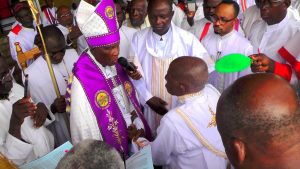
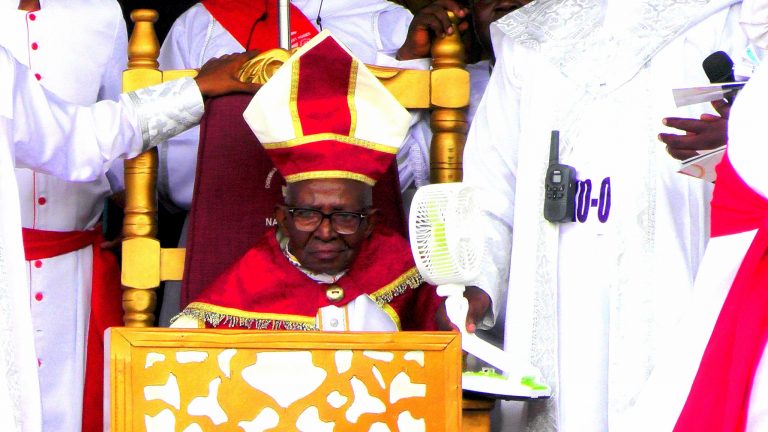
Headline
Nigerian Man Extradited From Malaysia, Convicted For $6.3m Fraud In US
Published
8 hours agoon
May 2, 2024By
Editor
A federal jury in New Haven, Connecticut, Wednesday, convicted an extradited Nigerian national, Okechukwu Osuji, for engaging in a business email compromise scheme out of multiple countries, including the United States.
This was revealed in a statement by the US Department of Justice on Thursday, saying that Osuji and his accomplices, John Wamuigah and Tolulope Bodunde defrauded their victims of over $6.3 million.
The jury convicted Osuji of conspiracy to commit wire fraud, wire fraud, and aggravated identity theft.
Principal Deputy Assistant Attorney General Nicole M. Argentieri, head of the Justice Department’s Criminal Division, said, “Osuji led a network of scammers in Malaysia and elsewhere in a sophisticated business email compromise scheme to defraud victims of millions of dollars.”
READ ALSO: Nigerian Sues Malaysia Govt N406m For Unlawful Detention
“Today’s conviction is another example of how the department’s collaboration with international law enforcement partners enables us to bring cybercriminals to justice in the United States.”
US Attorney Vanessa Roberts Avery for the District of Connecticut added, “While it is often difficult to identify and bring to justice cybercriminals operating overseas, today’s verdict demonstrates the expertise of the FBI and Stamford Police in uncovering this criminal network, and the shared commitment of our counterparts in Malaysia to ensure that fraudsters are held accountable in a court of law.
“We will continue to work to root out those who engage in internet fraud schemes, no matter where in the world they operate, and achieve justice for victims of these crimes.”
“The defendant perpetrated a complex international business email compromise scheme and laundered millions in stolen proceeds,” said Executive Assistant Director Timothy R. Langan Jr. of the FBI’s Criminal, Cyber, Response, and Services Branch.
READ ALSO: EFCC Arraigns Nigerian Who Posed As Woman To Dupe Malaysian
“This conviction is the result of hard work and close collaboration between the FBI and our local and international partners. Together, we will work aggressively to bring to justice anyone who engages in fraud and theft against Americans, no matter where they are in the world.”
“Today’s verdict provides a bit of closure to some victims of these often financially crippling crimes,” said Special Agent in Charge Robert Fuller of the FBI New Haven Field Office.
“It also displays our international ability to bring criminal actors to justice despite the complexities of their crimes. We want to thank all of our law enforcement partners here and abroad, as well as the U.S. Attorney’s office, for their dedication to serving justice.”
READ ALSO: Naira Abuse: EFCC, Cubana Chief Priest To Settle Out Of Court
Osuji who was deported by Osuji is slated to be sentenced on July 24 and faces a mandatory minimum of two years on the identity theft count and a maximum penalty of 60 years in prison on the wire fraud and conspiracy counts.
A Federal District Court judge will determine any sentence after considering the US Sentencing Guidelines and other statutory factors.
Osuji was arrested in Malaysia and extradited to the US in 2022. His alleged co-conspirator, Wamuigah, remains in Malaysia and is pending extradition proceedings, while another co-conspirator, Bodunde, pleaded guilty on February 16.
Headline
How Two Kenyan School Dropouts Made Prosthetic Arms For People With Disabilities
Published
16 hours agoon
May 2, 2024By
Editor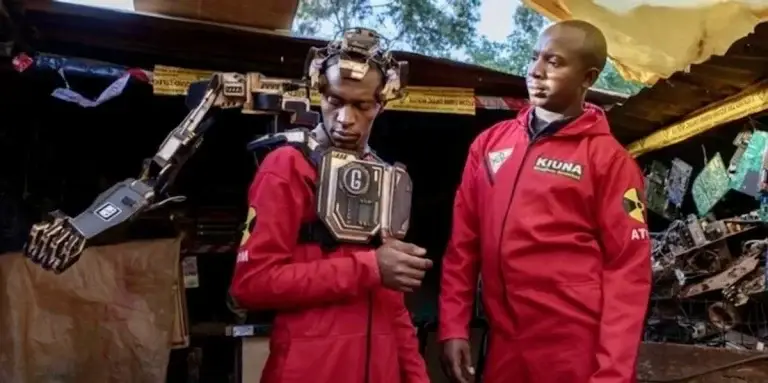
Two young Kenyan inventors have invented bio-robotic prosthetic arms from waste materials to help improve the lives of the physically challenged people in 2021.
Both David Gathu and Moses Kiuna were at the age of 29 when they designed a bio-robotic prosthetic arm in helping the people that have lost their limbs.
Recounting their ordeal before venturing into the invention, the duo said they were forced to drop out of college because of the expensive school fees but did not let the challenges steal their vision.
Gathu and Kiuna accomplished their dream to help their communities in a workshop in Kiambu county in Kikuyu, Kenya, north of the capital Nairobi.
READ ALSO: 14-year-old Boy Killed In London Sword Attack
According to Face to Face Africa, the workshop was basically a shed made out of worn-out rusted iron sheets standing next to a chicken coop.
The floor was covered with gravel, making the ground outside the shop and the interior all but indistinguishable, as brown broken glass with tape all around fits the window frame.
Brain signal bio-robotic arm
Another significant thing about the invention was being the world’s first bio-robotic arm operated by brain signals. The invention, which is controlled by brain signals, has been billed as a game-changer in the lives of disabled people in Kenya.
Gathu and Kinyua’s invention was unique and different from most prosthetic technology which is powered by a person’s muscles.
READ ALSO: Woman Reveals Secret To Longevity As She Celebrates 106th Birthday
The arm works by converting brain signals into an electric current by a “NeuroNode” biopotential headset receiver. NeuroNode biopotential was originally invented to help people suffering from paralysis and speech loss.
Also, the inventors narrated that the idea to develop an electronic prosthetic came to them during the pandemic as part of their contribution towards assisting Kenya to battle the pandemic. It was initially created to help COVID-19 sanitisation efforts.
“When the virus hit our country, we decided to create a machine that could help us decontaminate surfaces. It can also be used in schools, restaurants, hospitals,” Shoppe Black quotes Kinyua as saying.
Using waste products
According to a report by Anadolu Agency, the Kenyan inventors solved two problems with their innovations, first, by using waste products to make the environment clean and safe, and helping a community of people living with disabilities.
READ ALSO: Popular Iraqi TikToker Umm Fahad Gunned Down Outside Baghdad Home
“People throw away a lot of things that are harmful to the environment just because they don’t work. If they don’t work, it might be just one component that’s faulty but all the other components still work and can be recycled,” Gathu said.
“We’ve recycled everything that you see here. They throw it away, we pick it up and use it. This has saved us from spending a lot of money because we’re not backed up financially by anyone to come up with our innovations.”
They picked up “junk” that people threw away – things like plastic, rubber, wiring, old computer motherboards, LED lights, USB devices, switches, optical drives, heat sinks, fans, and power supply units – components that they say could be quite expensive to purchase from a shop.
Helping the community
READ ALSO: UK-based Nigerian Doctor Loses Licences Over Sex For Free Botox Injections
Speaking about the physically challenged people, he said, “The main reason we came up with this is to help people in our community who have lost their limbs. We don’t want these people to feel like they can’t do anything, we want them to be dependent on themselves.”
The arm can do many more tasks. They say they are still perfecting their device, but lack of funds has been a challenge.
David Mathenge from the Association for the Physically Disabled of Kenya (APDK), a charity NGO, says: “Such inventions are the future of the science of artificial limbs. This is the science we need to ease the challenges people with disabilities face.”

PICTORIAL: C&S Church Ayo Ni O Installs New Leader

Court Remands Tenant For Setting Landlord’s House On Fire In Ibadan

Officer Who Shot Man Dead During Fuel Queue Tumult Identified — Lagos Police
Trending

 Politics2 days ago
Politics2 days agoWhy Candidate Who Needs Interpreter Can’t Be Edo Gov – Shaibu

 Metro4 days ago
Metro4 days agoEdo Police Arrest Suspected Cultists Who Allegedly Killed Rival In His Daughter’s Presence

 Business3 days ago
Business3 days agoCustomers Panic As CBN Bans Opay, Palmpay, Others’ New Accounts

 News5 days ago
News5 days agoJUST IN: Popular Gospel Singer Is Dead

 News1 day ago
News1 day agoEx-policeman Who filmed Wife Having Wex With Her Superior Found Guilty Of Stalking

 News3 days ago
News3 days agoOoni: Suspended Benin Palace Functionaries Banished

 News2 days ago
News2 days agoJUST IN: FG Approves Salary Increase For Civil Servants

 News3 days ago
News3 days ago2024 UTME: JAMB Withholds Results Of 64,624 Candidates

 Metro4 days ago
Metro4 days agoGunmen Assassinate Governor Aiyedatiwa’s Campaign Coordinator In Ondo

 News3 days ago
News3 days agoBREAKING: JAMB Releases 2024 UTME Results






